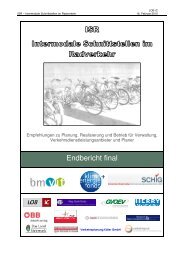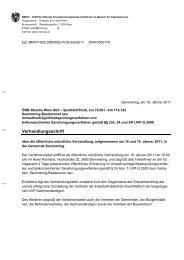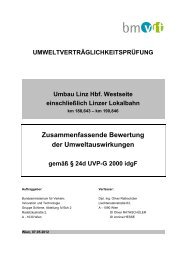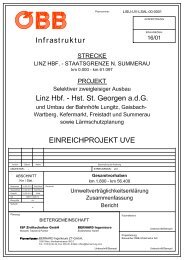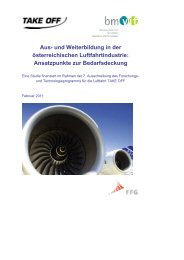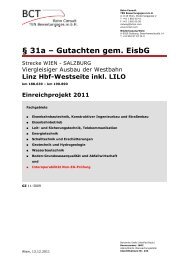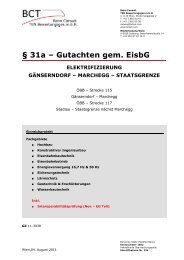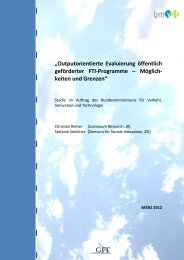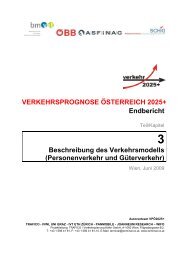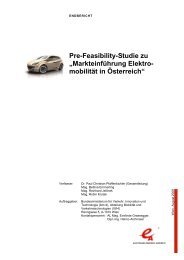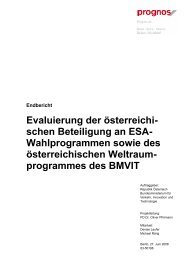Schriftenreihe .;technologiekompetenz Verkehr in
Schriftenreihe .;technologiekompetenz Verkehr in
Schriftenreihe .;technologiekompetenz Verkehr in
Create successful ePaper yourself
Turn your PDF publications into a flip-book with our unique Google optimized e-Paper software.
A3-PROJECTS<br />
A3 | A3 – Austrian Advanced Automotive Technology | A3 – 1 st Call (2002)<br />
QUANT-B<br />
Qualification and tra<strong>in</strong><strong>in</strong>g of teachers and skilled staff <strong>in</strong> the area of new technologies > Fuel cells and high power batteries<br />
The next step <strong>in</strong> the project was to <strong>in</strong>stall a demonstration fuel cell system at ECHEM.<br />
In parallel to the theoretical background, this system provides practical tra<strong>in</strong><strong>in</strong>g for both<br />
schools and companies, us<strong>in</strong>g experiments and simulations.<br />
In the first phase, the content requirement of units of tra<strong>in</strong><strong>in</strong>g – structured as modules<br />
– for „fuel-cell relevant” types of schools, colleges and universities was evaluated <strong>in</strong><br />
close cooperation with the PRO-BZ („Programme for the development of fuel cell<br />
expertise”) project. Us<strong>in</strong>g this <strong>in</strong>formation, model tra<strong>in</strong><strong>in</strong>g programmes were prepared.<br />
The importance of each <strong>in</strong>dividual module was assessed depend<strong>in</strong>g on the needs of<br />
the different target groups <strong>in</strong> the education sector and <strong>in</strong> companies.<br />
Different workshop concepts to implement these model tra<strong>in</strong><strong>in</strong>g programmes were<br />
prepared for „high-performance and traction batteries” and „fuel cell technology”.<br />
The workshop on „high-performance and traction batteries” gives an overview of<br />
important concepts relat<strong>in</strong>g to batteries and accumulators, as well as exam<strong>in</strong><strong>in</strong>g their<br />
technical design, the chemical processes tak<strong>in</strong>g place, their possible applications, and<br />
the charg<strong>in</strong>g/discharg<strong>in</strong>g techniques for the most important systems. The safety<br />
measures needed when ma<strong>in</strong>ta<strong>in</strong><strong>in</strong>g, repair<strong>in</strong>g or us<strong>in</strong>g battery systems are also dealt<br />
with, while an overview is given of relevant literature and (school) experiments.<br />
The presentation of the necessary physical chemistry pr<strong>in</strong>ciples, an overview of the<br />
different types of fuel cells and their applications, as well as the historical development<br />
of fuel cells were <strong>in</strong>cluded <strong>in</strong> the „fuel cells” workshop documentation. General<br />
background <strong>in</strong>formation on the concepts of „energy” and „electrical energy” was also<br />
<strong>in</strong>cluded. In the next steps, the challenges related to establish<strong>in</strong>g fuel cell technology<br />
and a hydrogen <strong>in</strong>frastructure, i.e. its storage and handl<strong>in</strong>g, will be elaborated.<br />
The QUANT-B project began with a needs<br />
assessment, with target groups for this<br />
assessment be<strong>in</strong>g the education sector <strong>in</strong><br />
Austria (<strong>in</strong>termediate and higher-level<br />
vocational schools, secondary schools,<br />
specialist colleges and universities) and<br />
companies. The assessment identified an<br />
<strong>in</strong>creas<strong>in</strong>g demand for cont<strong>in</strong>u<strong>in</strong>g education<br />
<strong>in</strong> the field of fuel cell technology. 83% of the<br />
teach<strong>in</strong>g staff and 90% of the pupils<br />
questioned agreed with the need for<br />
cont<strong>in</strong>u<strong>in</strong>g education; <strong>in</strong> the case of specialist<br />
colleges and universities, the percentages<br />
were 42% for the teach<strong>in</strong>g staff and 67% for<br />
the students. At the companies, 79% of those<br />
questioned recognised the need for<br />
cont<strong>in</strong>u<strong>in</strong>g education <strong>in</strong> the field.<br />
Project management:<br />
ECHEM – Center of Competence<br />
<strong>in</strong> Applied Electrochemistry<br />
Project partner:<br />
Vienna University of Technology –<br />
Institute for Chemical<br />
Technologies and Analytic / EC<br />
164, CATT Innovation<br />
Management GmbH<br />
45



